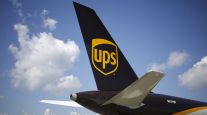UPS’ 3Q Profits More Than Double as Domestic Parcel Business Jumps
This story appears in the Nov. 4 print edition of Transport Topics.
UPS Inc.’s third-quarter earnings more than doubled to exceed $1 billion, owing to a year-earlier pension charge as well as help from improved domestic package business and higher less-than-truckload revenue.
Net income rose to $1.10 billion, or $1.16 a share, compared with $469 million, or 48 cents, including the pension-related charge — and $1.03 billion, or $1.06 per share, excluding it — the company reported Oct. 25.
Revenue totaled $13.52 billion, a 3.4% increase from $13.07 billion the year before.
“These are solid results considering the market,” said Kurt Kuehn, chief financial officer of the company ranked No. 1 on the Transport Topics Top 100 list of for-hire carriers in the United States and Canada.
In the domestic package business, profit before taxes and interest was 16% higher at $1.19 billion while revenue increased 5% to $8.25 billion from $7.86 billion.
“Results are stabilizing in a slow-growth global economy,” said a report from Robert W. Baird analyst Benjamin Hartford, who noted that domestic package margin goals set by UPS in 2011 have been reached in 2013.
Domestic revenue growth was achieved by a combination of higher rates and volume.
Less-than-truckload operating margin “declined slightly,” Kuehn said, without giving specifics. LTL profits are reported in the Supply Chain & Freight segment, where operating income rose 6.9% to $201 million.
LTL revenue rose 5.5% to $655 million, while truckload revenue, also included in UPS Freight’s results, rose 37% to $96 million.
In addition to a 4.5% rise in shipments handled per day, revenue per 100 pounds of freight was 2.2% higher at $22.35 while weight per shipment fell 1.4%.
UPS also maintained optimism about holiday shipping trends that are expected to include a 10% increase on the peak shipping day to 34 million packages handled. Stronger e-commerce will particularly boost business-to-consumer volume.
CEO Scott Davis said on a conference call that the holiday peak period will be different this year because there are six fewer shipping days than in 2012 because of the late Thanksgiving weekend next month.
“A compressed holiday period, probably will benefit us because we are going to be able to move our volume more efficiently,” Davis said. “The question is, if you get an ice storm in Louisville [UPS’ air hub], one of those days, it’s going to be really hard to make up for it.”
Davis also gave a brief update on labor talks that include a package contract covering about 235,000 workers and an LTL contract at UPS Freight, where about 12,000 Teamsters work.
In addition to the national LTL contract that was turned down and is being renegotiated, 10 of 17 side agreements remain to be ratified in the package agreement that was approved on a national level.
“The remaining supplements will go out soon, and we are confident in their approval,” Davis said, without giving a specific date.
In the international market, profit before interest and taxes fell 7.1% to $417 million though revenue increased 2.5% to $3.02 billion.
UPS attributed the decline in profit to the continuing shift to lower-margin deferred international cargo. That was reflected in an 11% increase in the deferred air cargo business.
Hartford’s report, however, noted that market trends in the international sector seem to be stabilizing after two years of steady deterioration.
Trends in forwarding were mixed.
International airfreight revenue fell along with tonnage and revenue shipment declines in the 3%-to-4% range. Ocean forwarding, domestic airfreight and brokerage results strengthened, Kuehn said.
Davis also said that “the uncertainty created by the partial shutdown of the U.S. government created some anxiety. The effect on UPS has been minimal.”
Kuehn discussed another national subject, health care, saying those costs are expected to rise $100 million next year.
UPS also maintained its full-year profit forecast of $4.60 per share to $4.85 per share that will include an increase in revenue of about 4%.
“We are making investments in emerging markets, health-care distribution and our worldwide retail delivery models, ensuring that UPS delivers both the solutions customers require and the returns our shareowners expect,” Davis said.




